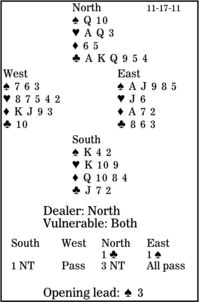Bridge column, November 17: Always look closely at the dummy

In other words, learn from your mistakes.
When a defender, always count the points in the dummy to see if it approximates what you were expecting after the auction and use its contents to influence your defense. In this example deal, you are sitting East. Your partner leads the spade three against three no-trump. What would you do?
North, with a great suit, spade help and no singleton or void, was right to rebid three no-trump. Do not play in five of a minor unless you are convinced three no-trump has no chance.
West led the correct spade. Giving length information is more important than strength information in partner's unsupported suit.
How did you defend? The bidding tells you that South has the spade king. Yes, if you cover dummy's 10 with your jack, you establish your suit -- but what will happen next?
South will take at least nine tricks: one spade, two hearts (you know the finesse is working if declarer needs it) and six clubs.
To defeat the contract, your side must win the first five tricks. Take the first trick and shift to the diamond two. Partner should win as cheaply as possible and return his diamond three to your ace. Then your next diamond lead gives your side five tricks: one spade and four diamonds. Lucky, yes; but winners are lucky.
** ** **
COPYRIGHT 2011, UNITED FEATURE SYNDICATE
DISTRIBUTED BY UNIVERSAL UCLICK FOR UFS

